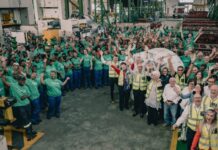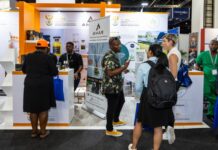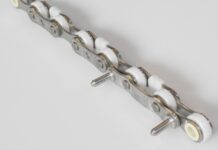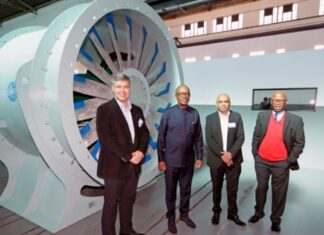By Larry Claasen
THE National Stainless Steel Centre (NSS) in Kempton Park, home to 200 staff members, faced mounting pressure from escalating wastewater issues and the broader water crisis in Gauteng.
Frequent honeysucker services, costing between R10 000 and R20 000 per visit increased their operational expenses, while overflow incidents caused raw sewage to spill into stormwater systems, resulting in pollution and unpleasant odours.Amid a worsening water shortage in Gauteng—marked by dwindling supplies and rising operational costs—Dries Louw of Waterbear Technologies, a Maskam Water dealer, presented a timely solution.
He introduced the Maskam Fusion® Wastewater Plant, a system designed to reduce costs while enabling water reuse in a region where every drop counts.
Fusion Wastewater Treatment Plants are decentralised solutions designed to meet and exceed the Department of Water and Sanitation standards. First introduced in Franschhoek in 2010, Fusion has since expanded with close to 400 installations across nine African countries. Its compact design, available in capacities from 1 000 litres to 15 000 litres per day, makes it ideal for residential, commercial, and community applications. Requiring no pre-treatment tanks, Fusion is perfect for space-constrained sites and offers versatile effluent disposal options, including irrigation, dams, trenches, or direct discharge.
With its underground installation and odor-free operation, it blends seamlessly into urban and remote environments.
Applications range from single households to schools, lodges, shopping centers, and entire communities, making it a versatile solution for diverse needs. By enabling the use of treated wastewater for non-potable purposes like toilet flushing and irrigation, Fusion provides an effective way to alleviate water scarcity while supporting sustainable development across Africa.
Investing in resilience
Initially hesitant due to the price, NSS soon realised the potential benefits.
As Dries explained, the system would pay for itself within a year by cutting honeysucker expenses and recycling wastewater for practical uses. The treated water could irrigate gardens, flush toilets, or even flow into natural streams, adhering to strict Department of
Water and Sanitation standards.
The promise of reduced reliance on municipal water and greater sustainability, especially during Gauteng’s ongoing water crisis, made the investment compelling. NSS embraced the opportunity, recognizing the system’s alignment with both economic and environmental goals.
Wastewater into opportunity
The installation of the Maskam Fusion® system was transformative. NSS now repurposes treated wastewater to maintain their gardens and refill a dam on their property. This dam, a peaceful habitat for swans and antelope, symbolises their shift toward sustainable practices.
Dries encapsulated the impact: “A small investment – big savings!”
This change eliminated the need for honeysuckers, cutting costs significantly while reducing NSS’s reliance on potable water. By proactively managing wastewater, NSS not only eased its operational challenges but also contributed meaningfully to alleviating regional water stress.
Setting the standard
NSS’s move to adopt advanced wastewater technology amid Gauteng’s water crisis is a powerful example of industrial leadership. The project showcases how businesses can respond to environmental challenges with solutions that are both financially and environmentally sustainable.
By partnering with Maskam Water, NSS has become a role model for industrial water management, proving that proactive investments in sustainability can deliver measurable returns. As water scarcity intensifies in Gauteng, the NSS story highlights a path forward for other organisations seeking resilience in the face of resource constraints.
For more information: http://www.maskamwater.com/















